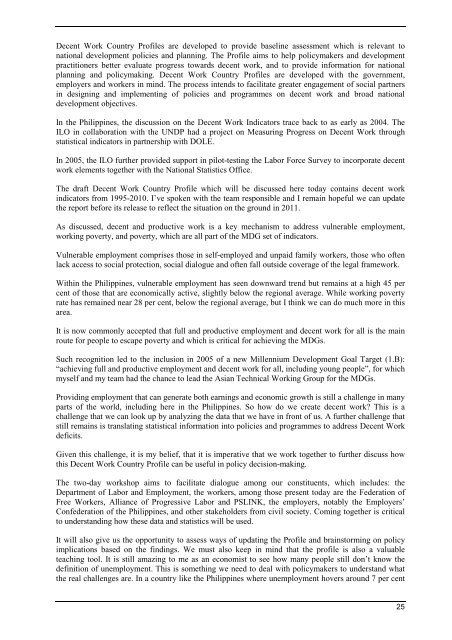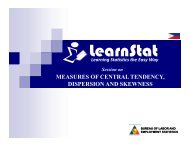Tripartite Validation Workshop of the Philippines Decent Work ...
Tripartite Validation Workshop of the Philippines Decent Work ...
Tripartite Validation Workshop of the Philippines Decent Work ...
Create successful ePaper yourself
Turn your PDF publications into a flip-book with our unique Google optimized e-Paper software.
<strong>Decent</strong> <strong>Work</strong> Country Pr<strong>of</strong>iles are developed to provide baseline assessment which is relevant to<br />
national development policies and planning. The Pr<strong>of</strong>ile aims to help policymakers and development<br />
practitioners better evaluate progress towards decent work, and to provide information for national<br />
planning and policymaking. <strong>Decent</strong> <strong>Work</strong> Country Pr<strong>of</strong>iles are developed with <strong>the</strong> government,<br />
employers and workers in mind. The process intends to facilitate greater engagement <strong>of</strong> social partners<br />
in designing and implementing <strong>of</strong> policies and programmes on decent work and broad national<br />
development objectives.<br />
In <strong>the</strong> <strong>Philippines</strong>, <strong>the</strong> discussion on <strong>the</strong> <strong>Decent</strong> <strong>Work</strong> Indicators trace back to as early as 2004. The<br />
ILO in collaboration with <strong>the</strong> UNDP had a project on Measuring Progress on <strong>Decent</strong> <strong>Work</strong> through<br />
statistical indicators in partnership with DOLE.<br />
In 2005, <strong>the</strong> ILO fur<strong>the</strong>r provided support in pilot-testing <strong>the</strong> Labor Force Survey to incorporate decent<br />
work elements toge<strong>the</strong>r with <strong>the</strong> National Statistics Office.<br />
The draft <strong>Decent</strong> <strong>Work</strong> Country Pr<strong>of</strong>ile which will be discussed here today contains decent work<br />
indicators from 1995-2010. I’ve spoken with <strong>the</strong> team responsible and I remain hopeful we can update<br />
<strong>the</strong> report before its release to reflect <strong>the</strong> situation on <strong>the</strong> ground in 2011.<br />
As discussed, decent and productive work is a key mechanism to address vulnerable employment,<br />
working poverty, and poverty, which are all part <strong>of</strong> <strong>the</strong> MDG set <strong>of</strong> indicators.<br />
Vulnerable employment comprises those in self-employed and unpaid family workers, those who <strong>of</strong>ten<br />
lack access to social protection, social dialogue and <strong>of</strong>ten fall outside coverage <strong>of</strong> <strong>the</strong> legal framework.<br />
Within <strong>the</strong> <strong>Philippines</strong>, vulnerable employment has seen downward trend but remains at a high 45 per<br />
cent <strong>of</strong> those that are economically active, slightly below <strong>the</strong> regional average. While working poverty<br />
rate has remained near 28 per cent, below <strong>the</strong> regional average, but I think we can do much more in this<br />
area.<br />
It is now commonly accepted that full and productive employment and decent work for all is <strong>the</strong> main<br />
route for people to escape poverty and which is critical for achieving <strong>the</strong> MDGs.<br />
Such recognition led to <strong>the</strong> inclusion in 2005 <strong>of</strong> a new Millennium Development Goal Target (1.B):<br />
“achieving full and productive employment and decent work for all, including young people”, for which<br />
myself and my team had <strong>the</strong> chance to lead <strong>the</strong> Asian Technical <strong>Work</strong>ing Group for <strong>the</strong> MDGs.<br />
Providing employment that can generate both earnings and economic growth is still a challenge in many<br />
parts <strong>of</strong> <strong>the</strong> world, including here in <strong>the</strong> <strong>Philippines</strong>. So how do we create decent work? This is a<br />
challenge that we can look up by analyzing <strong>the</strong> data that we have in front <strong>of</strong> us. A fur<strong>the</strong>r challenge that<br />
still remains is translating statistical information into policies and programmes to address <strong>Decent</strong> <strong>Work</strong><br />
deficits.<br />
Given this challenge, it is my belief, that it is imperative that we work toge<strong>the</strong>r to fur<strong>the</strong>r discuss how<br />
this <strong>Decent</strong> <strong>Work</strong> Country Pr<strong>of</strong>ile can be useful in policy decision-making.<br />
The two-day workshop aims to facilitate dialogue among our constituents, which includes: <strong>the</strong><br />
Department <strong>of</strong> Labor and Employment, <strong>the</strong> workers, among those present today are <strong>the</strong> Federation <strong>of</strong><br />
Free <strong>Work</strong>ers, Alliance <strong>of</strong> Progressive Labor and PSLINK, <strong>the</strong> employers, notably <strong>the</strong> Employers’<br />
Confederation <strong>of</strong> <strong>the</strong> <strong>Philippines</strong>, and o<strong>the</strong>r stakeholders from civil society. Coming toge<strong>the</strong>r is critical<br />
to understanding how <strong>the</strong>se data and statistics will be used.<br />
It will also give us <strong>the</strong> opportunity to assess ways <strong>of</strong> updating <strong>the</strong> Pr<strong>of</strong>ile and brainstorming on policy<br />
implications based on <strong>the</strong> findings. We must also keep in mind that <strong>the</strong> pr<strong>of</strong>ile is also a valuable<br />
teaching tool. It is still amazing to me as an economist to see how many people still don’t know <strong>the</strong><br />
definition <strong>of</strong> unemployment. This is something we need to deal with policymakers to understand what<br />
<strong>the</strong> real challenges are. In a country like <strong>the</strong> <strong>Philippines</strong> where unemployment hovers around 7 per cent<br />
25



